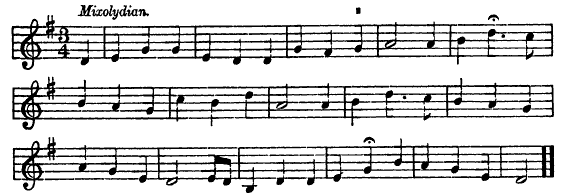Sally- M. A. S. (KS) pre1908- Barry JAFL 1914
[From an article "The Transmission of Folk-Song" by Phillips Barry, in Journal of American Folk-Lore, Volume 27 (Lancaster, Pa.: American Folklore Society, Jan.-Mar., 1914), page 73. Barry used initials of his informants, the text is from M.A.S. of Sidney, Kansas. The melody from MA. Additional text by Barry appears below, footnotes renumbered and moved to the end. Barry also presents a melody from 1790 titled "Fair Sally" which he says could be a version of this ballad- however this is pure speculation.
This ballad is not to be confused with the popular ballad, Child No. 73 Lord Thomas and Fair Annet, which is commonly known in the US, and Canada as "The Brown Girl."
US and Canada versions are based on the hundreds of late 18th century English broadsides sometimes titled "The Sailor from Dover" or "Sally and her Truelove Billy."
Child's B version of 295, "The Brown, Brown Girl" collected by Rev. S. Baring-Gould, introduced stanzas from the "Sally and her Truelove Billy" songs. In his article "Folk Song Tradition, Revival and Re-Creation" Steve Gardham has shown that Baring-Gould's ballad is a re-creation of two ballads and not traditional.
To put it simply, the versions are not related to "The Brown Girl" but are part of the "The Sailor from Dover" and "Sally and her Truelove Billy" song group. In the US and Canada some common titles are "Pretty Sally," "Sally," and "A Rich Irish Lady." They have been put here following Bronson and others who have attached them to Child 295, not because they belong here.
R. Matteson 2014]

SALLY[1]
1. There was a fair maiden, from Scotland she came,
Great riches and honor, and Sally by name;
Her riches were more than the king could possess,
And her beauty was more than her riches at best.
2. There was a poor boy who came to court her,
Whose wages were only one thousand a year,—
She being so wealthy, so lofty, so high,
That upon this poor (boy) she would scarce cast an eye.
3. "O Sally! O Sally! O Sally!" said he,
"I fear that your love and mine cannot agree,
Unless all your hatred should turn into love,
For your beauty's my ruin, I'm sure it will prove."
4. "No hatred for you, sir, nor no other man,
But as for to love you, I know I never can:
So you may retire, and end your discourse,
For I never will have you, unless I am forced."
5. "No forcing, dear Madam, and this you may own,
There are plenty of ladies who are living alone;
I'll go and I'll court one, in hopes you may rue:
So fare you well, Sally, I bid you adieu."
6. Three weeks had scarce come; three weeks had scarce passed,
When Sally was taken with love at the last,
Entangled in love, and she knew not for why;
But she sent for the young man she once did deny.
7. "Oh! am I the doctor, you send for me here?
Or am I the young man who once loved you so dear?"
"Yes, you are the doctor, can kill or can cure,
And without your assistance I'm ruined, I'm sure."
8. "O Sally! O Sally! O Sally!" said he,
"Don't you remember when you slighted me?
I courted with pleasure, you slighted with scorn,
And so now I'll reward you for what's past and gone."
9. "O Willie! O Willie! forget and forgive,
And grant me some longer in this world for to live!"
"No, Sally, I will not, not while I have breath;
But I'll dance on your grave when you're laid in the earth."
10. Then off from her fingers pulled diamond rings three,
Saying, "Take these, and wear them while dancing o'er me,
While dancing o'er Sally, o'er Sally your queen,
And her colors are there, now no more to be seen!"
11. Soon Willie was taken at hearing her doom,
And over his mind there grew a great gloom,—
Said he, "I'll retire, and lay by her side,
I'll wed her in death, and I'll make her my bride!"
This ballad is particularly interesting by reason of its close similarity in subject-matter, and in part in language, to "The Brown Girl."[2] In the version before us, Willie is made to relent; another text, however, lacking the last stanza,[3] represents him as proud and unforgiving,—the character which the situation demands.[4] Herein is added evidence that communal re-creation (in this case, the result of a less retentive memory) improves as well as alters ballads.
Footnotes:
1 "Fair Sally," A (Folk-Songs of the North Atlantic States); melody from H. L. W. (Cambridge, Mass.); text from manuscript of M. A. S. (Sidney, Kan.), loaned by H. L. W.
2 Not "Lord Thomas and Fair Annet," but Child, 295.
3 From C. A. G. (Des Moines. Ia.), sister of M. A. S. The text lacks also the fifth stanza.
4 Concerning "The Brown Girl" (No. 295), Professor Child wrote: "In the point of the proud and unrelenting character of the Brown Girl it is original." Of the two versions recorded by Professor Child, the second (B) is the more nearly like "Sally."